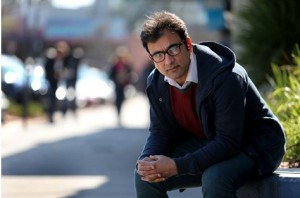Standing up for truth in the face of torture – a victim’s story
 Arrested four times, brutally tortured and his career ruined – Iranian asylum seeker Nik Salehi is hoping he can rebuild his life in Australia.
Arrested four times, brutally tortured and his career ruined – Iranian asylum seeker Nik Salehi is hoping he can rebuild his life in Australia.
Although he is happy to be safe from the clutches of the Iranian intelligence service, his future is uncertain and he is not sure whether he will be allowed to stay in Australia or when he will see his family again.
He is being treated for depression and post-traumatic stress and has not seen his wife and son in almost two years.
Nik, an ethnic Arab, was a medical scientist and university official until he fell foul of Iran’s notorious intelligence service.
After graduating from his university medical studies, he did compulsory military service and then returned to his home city of Shadeghan, which has a largely Arab population.
He held a senior position in a forensic drug laboratory working on testing samples from people accused of drug offences.
Around this time a group of dissidents in Shadeghan began protesting against the government of Mahmoud Ahmadinejad over the denial of rights to Arab citizens in Iran.
“A lot of people were not happy with the government. They protested against the government and a group of prominent dissidents emerged saying they would fight for the ordinary people.”
Nik was approached by agents of the Iranian intelligence service who demanded he produce fake drug reports implicating some of the leading dissidents in drugs crimes.
“They wanted me to help them manufacture drug cases against these people. My problems all started from here. Having just seven grams of certain drugs means a death penalty in Iran.
“I had many people supporting me, saying I should not agree to do this so I refused. Some of the people they wanted me to implicate were my friends. So, because I took a stand against what they wanted from me, they made a case against me.”
Nik was arrested at work and taken to a prison where he was put in a small dark room.
“I was in the room for 11 days – not knowing exactly where I was or what time of day it was,” he said.
“This was where the torture started. I was released on condition that I cooperate with them – but still my friends said not to.”
Nik was arrested for a second time and jailed for six months after being convicted of anti-government activities.
“I was placed in the small room again – this time for about 15 days. They tortured me physically, mentally and emotionally,” he said.
Nik finds it painful to recount his torture ordeal and was visibly upset when he did. But he said he wanted people to know what had happened to him.
He described how his ankles were bound and he was hung from the ceiling for hours.
He was ‘waterboarded’, which means he was bound to a chair and had a cloth placed over his mouth and nose. Cold water was then poured over the cloth making it difficult to breathe.
This form of torture can cause an individual to experience the sensation of drowning. It can cause extreme pain, dry drowning, damage to lungs, brain damage from oxygen deprivation, broken bones due to struggling against restraints and lasting psychological damage.
Nik says he was also stripped and sexually assaulted. He had a steel bowl placed over his head which was then hit repeatedly with a hammer – causing painful sounds and vibrations.
He said that the easiest part of his nightmare to endure was being thrown in a corner and punched and kicked.
“The worst thing,” he said, “was when they told me they had my wife and were going to sexually abuse her or kill her. That was the worst kind of mental torture.”
After his release, Nik moved to another city called Ahvaz to work.
“I thought that maybe they would forget about me, but I was wrong,” he said.
“There were protests during the election of Amadinejad and I was a supporter of the reformist candidate Mir Hossein Mousavi.
“My name appeared on a list of Mousavi supporters that was seized by the intelligence service. I was locked up in the small room for a third time and tortured again for about 10 to 15 days.
“After that I left Iran. My friends told me I had better leave the country. So I went to Indonesia and boarded a boat to Australia and arrived here on August 28, 2012.”
Nik is being treated by a psychologist for the effects of torture.
“What happened still affects me severely, I can’t sleep and I can’t concentrate on things,” he said.
Nik said when he left Iran, his son was 15 months old – he is now three.
“I have not seen my son since he was a baby. My wife is raising him alone and she is also seeing a doctor and taking medicine because of what happened to us,” he said.
Nik says he is slowly recovering from his ordeal.
Recently, he phoned his wife and says he is feeling better for it. But he says he keeps his once-every-two-months calls short for fear of retribution and because he knows the lines are tapped.
Nik is also volunteering at a local church and says he has been exploring a long-held interest in Buddhism.












